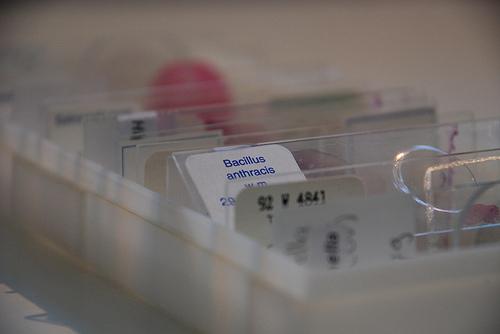Documentary questions whether FBI ID’d right suspect in anthrax attack
Anthrax sample (tomski777/flickr)
Story by The Takeaway. Listen to audio above for full report.
Not long after Sept. 11, anthrax began showing up at offices around the United States, ultimately killing five and putting the country on edge.
The Federal Bureau of Investiation launched an immediate and wide-ranging investigation that led them to one man who they say acted alone: Bruce Ivins. Only problem was, he was never charged. He committed suicide in 2008 and a short time later, the FBI layed out what it says was his plan and motives.
A new documentary out tonight, however, says not so fast. The Anthrax Files, from PBS Frontline, sets out to look at the conclusions the FBI drew, and how they got there.
“They tell us they were there and hoping they could get an indictment, arrest him and take him to trial as soon as they possibly could,” producer Michael Kirk said. “I think they really believe still that they have a very, very strong case against Bruce Ivins.”
But Kirk’s not so sure, and he’s not the only one with questions. A group of scientists spoke out earlier this year when the FBI formally closed the case.
Dr. Claire Fraser-Ligget, director of the Institute for Genome Sciences at the University of Maryland, whose lab did research for the FBI, says what they did represents the best science — they determined what lab the anthrax strain came from — but was not a substitute for the investigative work that had to go on to actually identify a suspect.
“It always clear to me science was never going to identify the perpetrator,” she said.
Kirk said the enormous pressure on the FBI to solve this case — which included misidentifying one suspect — may have led the FBI to make mistakes. But he thinks the case is still solvable.
———————————————-
“The Takeaway” is a national morning news program, delivering the news and analysis you need to catch up, start your day, and prepare for what’s ahead. The show is a co-production of WNYC and PRI, in editorial collaboration with the BBC, The New York Times Radio, and WGBH.
